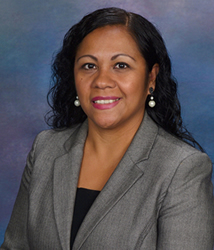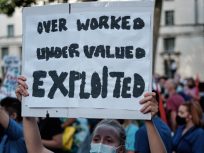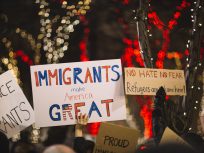
On this May Day, an internationally recognized workers’ day, we are reminded that thousands of American workers continue to face discrimination on the job each year based on a protected status, such as race, gender or religion, despite a patchwork of existing state and federal anti-discrimination laws. In recent years, for example, nearly 100,000 workers have filed discrimination claims annually with the U.S. Equal Employment Opportunity Commission (“EEOC”), and about one-third of these claims are based on allegations of racial discrimination. Eradicating racial bias and other forms of employment discrimination could lead to a dramatic decrease of poverty while promoting better working conditions and human rights for all workers.
As a union-side labor attorney, I regularly help unions combat employment discrimination against their members through collective means, such as bargaining, strikes, boycotts and pickets (also known as economic “weapons of war”). These concerted activities, which are protected by the National Labor Relations Act (“NLRA”), often prove to be extremely effective for workers, particularly in the context of a union organizing drive. However, with regard to non-unionized employees experiencing racial discrimination, historically the standard legal approach has been to file individual claims with the EEOC or an equivalent state or local agency, rather than taking collective action. Yet, in some cases, non-unionized workers would greatly benefit from taking a collective approach to address racial discrimination. Below is on one such example.
Recently, I met with an African-American janitor who lost his job at a non-unionized company after complaining to a co-worker that a supervisor was engaged in discriminatory practices against several janitors. The supervisor overheard the conversation and reported it to upper management. To justify the janitor’s termination, the employer pointed to its “attitude expectations” policy, which prohibits employees from gossiping, lowering morale and complaining too much. In this situation, the janitor could have pursued an individual claim with the EEOC, but instead opted to pursue the matter with the National Labor Relations Board (“NLRB”) on the basis that the employer unlawfully coerced, restrained and interfered with employees’ right to act together for mutual aid and protection (also known as Section 7 rights). If successful, the janitor would be entitled to reinstatement with back pay and the employers’ overly broad “attitude expectations” policy would be struck down. Most importantly, an approach through the NLRA would keep the focus on collective action, thereby serving as a vehicle to mobilize workers to improve their workplace by acting together with one voice. It is important to note that the janitor would not be precluded from separately pursuing an individual EEOC claim, which could entail additional remedies, such as punitive damages and attorneys’ fees.
May Day is a great opportunity to reconfirm that the NLRA applies to private sector employees whether they are unionized or not. Cases have held that an individual employee, although acting alone, is protected under the NLRA as long as his or her activity is concerted or done on behalf of others. See Compuware Corp. 320 NLRB 101, enforced, 134 F.3d 1285 (6th Cir. 1998) (employee who said he was going to “speak for all of us” was engaged in concerted activity). Finally, employees have a right under the NLRA to discuss among themselves workplace issues, and this includes shared concerns about racial discrimination. See America’s Best Quality Coatings Corp., 313 NLRB 470 (1993), enforced, 44 F.3d 516 (7th Cir. 1995) (African-American employee who surveyed other minority employees and then complained to employer about racial bias in promotions was engaged in protected activity). In this way, civil rights include labor rights.
Dovie King is a Partner at Ochoa Legal Group which is a public interest law firm based in San Diego, California, and is committed to advancing social and economic justice for workers. For more information on Ochoa Legal Group, go to http://www.union-attorneys.org/index.html.




